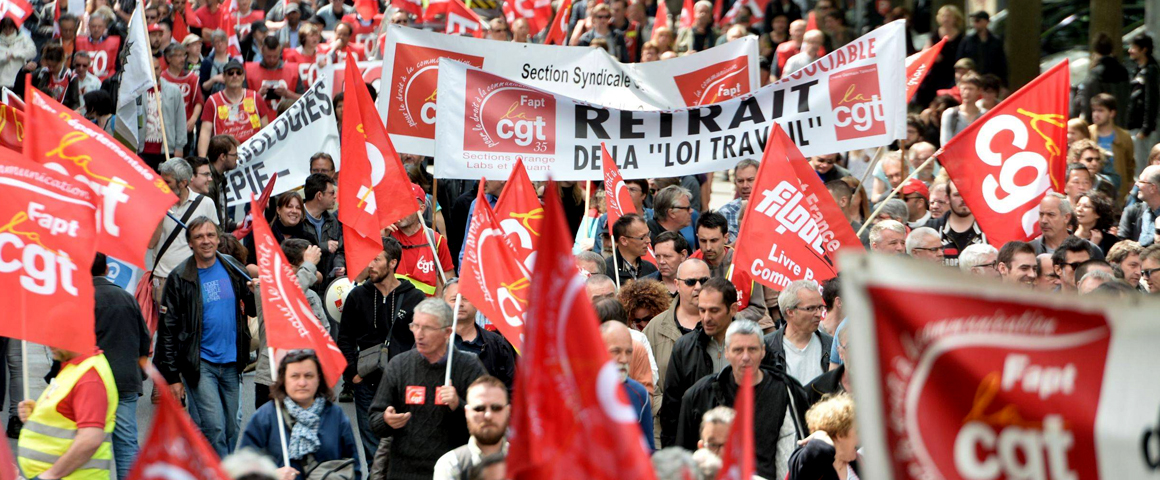PV Vancouver Bureau, with files from the Morning Star and other sources
One of the biggest labour struggles carried out in decades by French workers continued through June, as the country hosted the Euro 2016 soccer tournament. Mass strikes and protests erupted in May against the “El Khomri law,” shutting down key sections of the economy. Named for the Labour Minister Myriam El Khomri, the law allows management to slash overtime pay, extend working hours, and fire employees with less restrictions. The Socialist party government argues that the attacks on labour rights and conditions are required by the European Union, highlighting a key reason for working class opposition to the EU in many countries.
The movement began several months ago, with mass occupations of the Place de la République in Paris and other city squares throughout France to protest the so-called “labour reforms.”
As the month of June began, CGT union federation CGT leader Philippe Martinez warned the government to withdraw its notorious legislation, and striking workers crippled the French railway network. Over half the country’s regional train services were cancelled as well as 40 per cent of journeys on the high-speed TGV network.
Three of the four unions representing staff working for the SNCF national rail authority called open-ended walkouts. The rail strikes were accompanied by walkouts in other sectors including oil refineries, leaving an estimated 20 per cent of French service stations dry. Aviation workers announced plans to walk out, putting more pressure on the government.
Prime Minister Manuel Valls and the labour minister called on the CGT to propose a solution. But Martinez said that negotiating a compromise was dependent on the withdrawal of the law, which Valls forced through parliament without a vote by invoking a constitutional mechanism reserved for emergencies.
“There are articles which pose problems and that’s why we must remove the law and renegotiate,” Martinez said. He fingered the law’s article two as the “backbone” of the legislation and demanded its removal.
Considered to be “the philosophy of the Act” and therefore indispensable, Article 2 establishes the primacy of company-level bargaining as opposed to sectoral and nationally negotiated agreements.
On June 2, some 120,000 homes in western France were hit by a blackout during strikes at 16 of the country’s 19 nuclear power plants. CGT members voted for a one-day walkout at the power stations, which generate most of France’s electricity. Nuclear plants are required to maintain a minimal level of production during strikes for security reasons.
But workers in Brittany cut the electricity supply from a power station in Saint-Malo-de-Guersac, prompting the blackouts for much of the day.
Meanwhile, striking rail workers blocked tracks at the Gare de Lyon station in eastern Paris ahead of a protest march through the capital. Around half of all long-distance services were cancelled and some Paris public transport workers also walked out in solidarity.
The struggle continued over the following days, against the backdrop of final preparations for the Euro 2016 tournament. Transport Minister Alain Vidalies vowed to use scab labour after rail workers threatened to walk out on the line serving the Stade de France in St Denis outside Paris, where France played Romania in the June 9 opening match.
On the same day, Air France pilots called a four-day strike, just as an estimated two million fans were set to arrive in the country. In Paris, Mayor Anne Hidalgo brought in 80 privately operated garbage and crews to clear up piles of stinking rubbish which had accumulated during a 12-day refuse collectors’ strike in the capital.
Sports Minister Thierry Braillard complained that disrupting the tournament was “just not normal.” But train driver Berenger Cernon, secretary of the CGT union federation’s branch at the Gare de Lyon in Paris, was defiant, saying: “We did not decide that the Euros will take place on this date. There is a social movement going on now. The reorganisation [of labour] continues, the labour law continues.”
President Francois Hollande said he would take “all necessary measures” to make sure the tournament goes smoothly. “Public services will be provided,” he vowed. “The whole of Europe will be watching.”
“Let us be clear, the government has no intention of withdrawing this law, or of unravelling it,” added El Khomri.
While the tournament went ahead, thousands of demonstrators rallied in the streets of Paris on June 14, mobilized by seven trade unions and student organisations. Rail workers and taxi drivers were on strike, and 20 per cent of Air France flights were cancelled when pilots walked out in a separate dispute. At the Eiffel Tower, an electronic board read: “Monument closed — national strike.”
But by that date, the Socialist Party government had bypassed parliament to pass the law by decree, sending it for debate in the senate.
On June 17, CGT general secretary Martinez met with El Khomri over the anti-worker bill. Martinez called the half-hour meeting a “constructive exchange” but said that neither side had shifted their position significantly.
He added that two demonstrations set for June 23 and 28 — when senators will vote on the legislation — would not be cancelled unless six crucial pieces of the bill were rewritten or removed before sending it back to parliament.
A few days later, the government had to back down on plans to ban the June 23 march. Interior Minister Bernard Cazeneuve said he had personally ordered the ban, but then decided to allow the protest after an emergency meeting with unions where a compromise was reached on where the rally could be held.
Hours earlier, Paris’s police chief had said he had “no choice but to ban the demonstration” for supposed safety reasons after the unions refused to stage the protest in the Place de la Bastille, wanting instead to march through the streets. Under the deal the march instead followed a one-mile loop around the foot of the square.
This would have been the first ban on a union demonstration in France since 1962. Karine Berger, a Socialist MP who has criticised the government’s policies, tweeted: “We’re back to what French democracy should be like.”
Fellow Socialist backbencher Christian Paul had earlier said Prime Minister Valls was making “a historical mistake” with the ban, highlighting rifts within the ruling party a year ahead of presidential and parliamentary elections.




